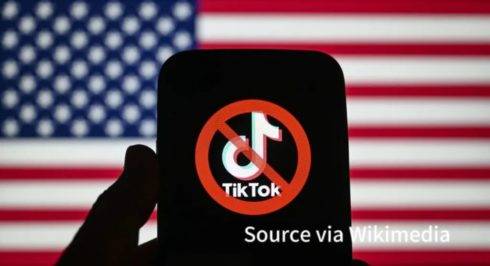The US House of Representatives has taken a significant step toward potentially banning TikTok nationwide by passing a landmark bill. The legislation mandates ByteDance, TikTok’s Chinese parent company, to sell its controlling stake within six months to avoid the app’s blockage in the US. Despite receiving overwhelming bipartisan support, the bill’s journey to becoming law requires clearance from the Senate and the president’s signature.
Lawmakers’ apprehensions about China’s influence over TikTok have been longstanding. ByteDance, founded in 2012 and headquartered in Beijing, operates TikTok, a social media platform popular among American youth. The company’s global footprint extends to the Cayman Islands, Europe, and the US, raising concerns about data privacy and national security.
If approved by the Senate and signed by President Joe Biden, the bill could provoke a diplomatic clash with China. Beijing has adamantly opposed forced divestiture efforts, emphasizing retaliation against US interests. Despite assurances from TikTok regarding data security measures, concerns persist about potential data sharing between ByteDance in China and TikTok operations in the US.
National Security Concerns and Data Privacy
The proposed legislation underscores bipartisan worries about national security threats posed by Chinese-controlled entities operating within the US. Mike Gallagher, a Republican co-author of the bill, highlighted the risk of a dominant social media platform falling under Chinese Communist Party influence. The law aims to safeguard user data from potential exploitation by foreign adversaries, aligning with broader efforts to mitigate cybersecurity risks.
TikTok’s attempts to address regulatory concerns have been met with skepticism, with reports suggesting ongoing data vulnerabilities. The Wall Street Journal investigation revealed lapses in data protection, including unauthorized access by ByteDance employees in China. Such incidents fuel apprehensions about the app’s susceptibility to external manipulation, prompting calls for stricter regulatory oversight.
Political Ramifications and Opposition
The bill’s passage sets the stage for Senate deliberations, with its fate uncertain amid political divisions. Senate Majority Leader Chuck Schumer signaled the chamber’s intent to review the legislation, but partisan disagreements loom large. Former President Donald Trump’s reversal on the bill following interactions with Republican stakeholders complicates its reception among party members. Opposition from both sides of the aisle reflects broader debates about corporate regulation, data sovereignty, and geopolitical tensions.
Critics argue that a TikTok ban could alienate younger voters, posing challenges for political parties seeking to engage with this demographic. Democrats, in particular, face dilemmas as they navigate policy responses to emerging technologies and national security imperatives. The bill’s fate hinges on delicate negotiations and strategic alliances, underscoring the complexities of legislative processes in an era of digital globalization and geopolitical rivalry.
Senate Intelligence Committee’s Response
The leaders of the Senate Intelligence Committee have expressed their approval of the House vote regarding the bill concerning TikTok. Mark Warner, representing the Democrats, and Marco Rubio, representing the Republicans, emphasized their commitment to guiding the bill through the Senate. In a joint statement, they articulated concerns about the national security implications of TikTok, highlighting its potential to influence and divide Americans. They underscored the ongoing obligation of ByteDance, TikTok’s parent company, to comply with the directives of the Chinese Communist Party, framing the platform as a significant security threat.
Following the House vote, TikTok intensified its efforts to mobilize users to lobby Congress. Notifications urging users to contact their representatives were sent out, echoing a similar strategy employed the previous week. However, this tactic seems to have backfired, with congressional offices reportedly inundated with calls, further solidifying opposition to TikTok within the legislative sphere. Outside the White House, a small group of supporters voiced their dissent against the bill. Tiffany Yu, a disability advocate, emphasized the platform’s importance to her work, while Ophelia Nichols highlighted its adverse effects on US businesses. Content creator Mona Swain shared her fears of losing her livelihood, as her earnings from TikTok support her family’s financial needs.
International Response and White House Perspective on potential banning of TikTok
In response to the bill, the Chinese Foreign Ministry criticized the United States for targeting TikTok without evidence of national security threats. The spokesperson condemned what they described as bullying tactics that disrupt normal business activities and undermine international investment confidence. However, the White House defended the bill’s intent, emphasizing the need to prevent major technology platforms from falling into the hands of entities that could exploit them. The bill seeks to safeguard US interests and maintain control over critical technology assets, echoing broader concerns about foreign influence and data security.
Financial Implications and Potential Buyers
Despite the uncertainty surrounding TikTok’s future ownership, analysts predict a high level of interest from potential buyers in the US. ByteDance’s valuation of TikTok at approximately $268 billion presents a significant hurdle for prospective investors. While major social media companies may express interest, anti-monopoly regulations and financial constraints could complicate acquisition efforts. Emarketer analyst Jasmine Enberg highlighted the likelihood of smaller firms, such as Snapchat, expressing interest but facing financial limitations. The complex history of TikTok’s attempted sale during the Trump administration underscores the challenges associated with securing a viable deal. Despite these obstacles, TikTok’s exponential growth in advertising revenue signals its enduring appeal and potential for further expansion in the digital marketplace.
Table of Contents
Discover more from OGM News NG
Subscribe to get the latest posts sent to your email.













